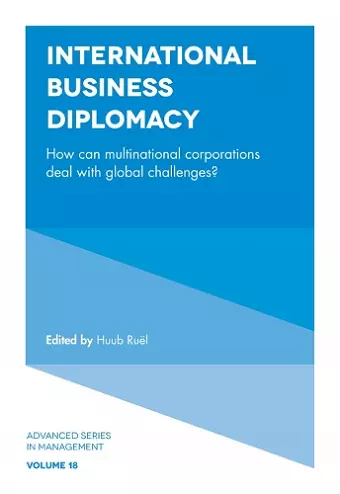International Business Diplomacy
How can Multinational Corporations Deal with Global Challenges?
Format:Hardback
Publisher:Emerald Publishing Limited
Published:23rd Nov '17
Currently unavailable, and unfortunately no date known when it will be back

Multinational enterprises (MNEs) experienced ‘golden days’ during the 1990s and 2000s, they expanded globally and were major players in globalization. Today they have become powerful actors in the global economy. CEOs of international businesses are welcomed by heads of state as their counterparts, they are invited by governments to help solve global issues such as climate change and poverty, and they are facing dilemmas comparable to those of other international actors.
However, MNEs are facing global legitimacy challenges. They are suspected of tax avoidance, using low wage countries for corporate benefits only, disrespecting privacy regulations, abusing consumer data, violating local community rights, exploiting natural resources, ignoring basic human rights, and employing too many lobbyists targeting national and international political decision-making processes for their own corporate interests.
Although many of these challenges are not new, they have resurfaced and become more apparent during the past couple of years, partly due to the economic recession that many developed economies have faced and to the broader awareness of increasing global inequality and the importance of sustainability.
How can international business respond? Strategic business diplomacy may be the answer. Business diplomacy involves developing strategies for long-term, positive relationship building with governments, local communities, and interest groups, aiming to establish and sustain legitimacy and to mitigate the risks arising from all non-commercial or exogenous factors in the global business environment.
Business diplomacy is different from lobbying or strategic political activity; it implies an (strategic / holistic) approach of an international business to look at itself as an actor in the international diplomatic arena. Representation, communication and negotiation are key in such an approach. One of the consequences is that MNEs are able to operate in and show respect for an international business environment that consists of multiple stakeholders. This demands a strategic perspective and vision on the sector and the business environments in which the company wants to operate, and requires a specific set of instruments, skills and competences.
Researchers and practitioners in business and diplomacy explore how multinational corporations can use diplomacy to help them deal with challenges in the international business arena. Their topics include business diplomacy in implementing the global 2030 development agenda: core competencies needed at the corporate and managerial levels, business diplomacy in emerging markets: the intersection of roles between states and multinationals, the ethics and business diplomacy of multinational company tax avoidance, the legitimacy of state ownership in foreign direct investments by emerging economic firms, and corporate diplomacy and institutional upheaval in host countries: the "Arab Spring" experience of two Canadian multinationals in Egypt. -- Annotation ©2018 * (protoview.com) *
ISBN: 9781787430822
Dimensions: 240mm x 165mm x 19mm
Weight: 566g
296 pages